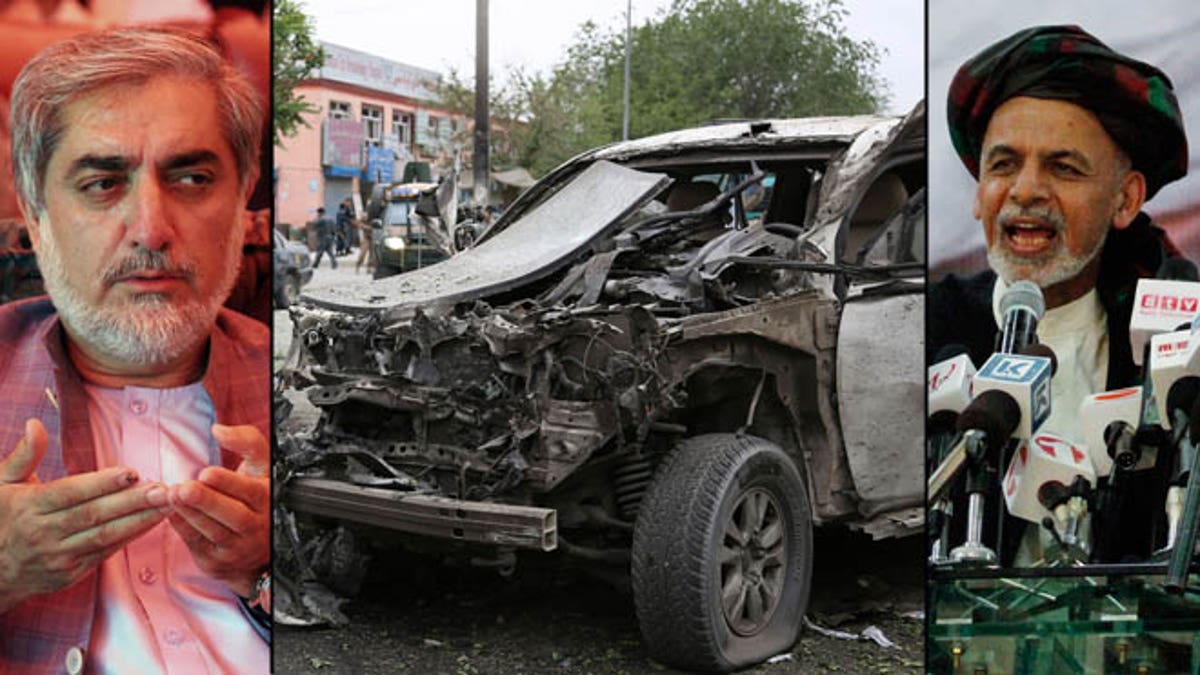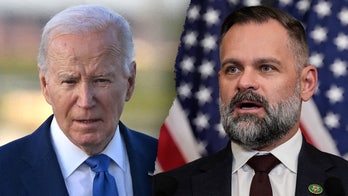
Shown at left is Afghan presidential candidate Abdullah Abdullah; at right is rival Ashraf Ghani; at center is the site of an attack that struck Abdullah's convoy on June 6. (AP)
The only election that might matter as much to America as the midterms this year is taking place next week, as Afghanistan chooses a new leader to guide the country after more than a decade of war.
For the first time since 2001, Afghans will be choosing a president whose name is not Karzai. The transition is an opportunity for the Afghan people to turn the page on a tenure fraught with corruption and mismanagement, and for America to move beyond an increasingly bitter and contentious relationship.
It also carries the risk that hard-fought gains could unravel in an instant -- observers were reminded of this Friday, when the leading presidential candidate Abdullah Abdullah escaped an apparent assassination attempt when his convoy was bombed.
Those risks may have grown after the Obama administration freed five Taliban leaders from Guantanamo in exchange for captured American Sgt. Bowe Bergdahl. Sources close to Abdullah told Fox News the candidate is extremely concerned about the Taliban members' release.
Who will lead the war-torn country will be decided in a June 14 runoff between Abdullah and rival Ashraf Ghani. Aside from evident security challenges, another key question is whether the winner will survive the horse-trading and notorious political corruption to emerge a reformer, or send Afghanistan down a path to more of the same, or worse, civil war.
Some are more optimistic than others.
"This is a proud moment for Afghanistan -- the fact the election was so successful, and if the runoff is not disruptive, then these guys have great potential to help Afghanistan through its most challenging problems and both would be a great partner for the United States," said Vikram Singh, former deputy assistant secretary of Defense for South and Southeast Asia, now the head of the national security division at the Center for American Progress.
"These men are both a sea change for Afghanistan," he told FoxNews.com.
Others, like Afghan television host Nabil Miskinyar, who runs the American-based Ariana Afghanistan television network and just returned from a trip to Afghanistan, are not so upbeat.
The runoff was set into motion when neither candidate got more than 50 percent of the vote in the April presidential election.
Miskinyar said the people he spoke to, particularly younger voters in Kabul, "don't see any hope for a future in both candidates." The security situation, made worse by Taliban threats to disrupt the runoff, has darkened the landscape. "They've lost hope."
America's interests are still wrapped up in Afghanistan's.
While President Obama said last week that it is "time to turn the page" on the 13-year war in Afghanistan, he plans to leave 9,800 U.S. troops there beyond the planned withdrawal at the end of this year (down from the current 32,800 in the country today). The security situation there remains unstable, with the Taliban fighting season ramping up with attacks on government compounds and police reported daily, including 22 Afghan officers killed in ambushes on May 21.
Meanwhile, after an estimated $100 billion in U.S. tax dollars poured into the country for aid and reconstruction since 2002, Afghanistan continues to top the list of most corrupt countries in the world -- while critics say Washington's claims of success in boosting the Afghan economy, healthcare, education and infrastructure are exaggerated and largely unsubstantiated. The Special Inspector General for Afghanistan Reconstruction (SIGAR) has warned that many of the projects funded by the U.S. in this regard already are failing or will be unsustainable once the American aid runs out.
This is the country one man will inherit after June 14.
"I think the core issue here for everyone is how soon can a government be formed and how effective will that government be? How good will it be in a year when we are effectively rushed out of the country?" said Anthony Cordesman, former Pentagon official and national security analyst for the Center for Strategic and International Studies (CSIS).
"These are issues that no one can ever really predict," he told FoxNews.com in a recent interview. "One can be cynical and pessimistic about [the candidates'] abilities to adapt, but you can also be grossly optimistic. And we have seen with Karzai that kind of optimism can be dangerous."
Anyone but Karzai
Observers generally agree that either candidate will have a better relationship with the U.S. than Karzai, who in recent years has vacillated between partner and agitator, most recently refusing to sign the bilateral security agreement necessary to keep troops in the country after 2014. Both Abdullah and Ghani have agreed to sign the document, and welcome the continued presence of combat troops assisting Afghan security forces beyond that time.
"Either one of them would sign an accord. I don't see any substantial difference between the two in regards to a relationship with the U.S.," said Otilie English, a former assistant professor at the American University of Afghanistan in Kabul. "The attitude will be better than anything they have in there now."
According to reports and experts who talked to FoxNews.com, this vote is more about the horse trading among Afghanistan's political elite and ethnic factions than it is about retail politics.
Abdullah, an ophthalmologist by training, was first part of the anti-Soviet resistance movement in the 1980s, then a key member of the Northern Alliance -- which fought against the Taliban takeover of Afghanistan in 1996 and worked with U.S. forces to roust the Taliban from the country after 9/11. Abdullah became foreign minister under Karzai. He resigned in 2005 and ran against Karzai in the 2009 elections. Though he came in second with 30 percent of the vote, he quit the runoff because he complained of rampant fraud and vote-rigging in Karzai's favor.
Abdullah, who has promised reforms in Afghan government, is part ethnic Tajik and part Pashtun, which is the largest ethnic group in Afghanistan. He got 45 percent of the vote in the April elections and is seen as the frontrunner in the runoff.
Meanwhile, Ghani, who is full Pashtun, is known as a technocrat with wide name recognition and regard in the West, particularly for his work with the World Bank in international development plans and assistance. He served as finance minister, and was largely credited with early domestic reforms in Afghanistan under Karzai, but reportedly quit in 2004 after what he saw as the administration's unwillingness to stop the unbridled corruption in government. Since then, he has embarked on campaigns to improve development, written books and served as chancellor of Kabul University -- and ran unsuccessfully for president in 2009.
Ghani received 31.5 percent of the vote in April's elections and is seen as the underdog in the runoff.
Horse trading
Abdullah's strength right now is the alliances he's making during this critical period of deal-making, observers tell FoxNews.com. In the last month he has racked up numerous pledges of support from his former opponents and members of their campaigns from a wide swath of tribal and political strongholds. Some, while having the short-term advantages of helping him to win, could prove problematic down the road, critics say.
"The deal-making that is going on is very sad," said English.
Karzai's supposed favorite, Zalmay Rassoul, who was a distant third in the election with 11 percent of the vote, has thrown his support behind Abdullah. In addition, around 150 members of parliament have declared their support for Abdullah, as has Mahmoud Karzai, the controversial Karzai brother closely associated with the Bank of Kabul bank scandal in which nearly $1 billion went missing in 2010.
In the last week, campaigners from the staff of powerful Pashtun warlord Abdul Rasoul Sayyaf went over to Abdullah's side. (Sayyaf was largely considered the one who welcomed Usama bin Laden into Afghanistan and who vouched for the two "journalists" who assassinated Northern Alliance hero Ahmad Shah Massoud two days before 9/11 in Afghanistan.)
The candidates both come with uneasy alliances. For his part, Ghani tapped into the wide support offered through Gen. Abdul Rashid Dostum when he made him a running mate. Dostum is popular but has a storied past, and was accused of stuffing thousands of Taliban prisoners into shipping containers and suffocating them to death in 2001. He has denied those accusations, but his place on Ghani's ticket has raised more than a few eyebrows. Ghani, who has not garnered as many big name endorsements as Abdullah, did secure the support of the Islamist Alliance of the Hezb-e-Islami Party council in May.
While critics worry all this horse trading will leave either candidate irreparably compromised for the future, others say this is how Afghan politics works. The trick is to manage the alliances and not let the country fall back into violent warlordism and civil war.
"If you want to lead the real Afghanistan, you have to make deals with a host of players, and some with unsavory pasts and backgrounds. This is the reality of Afghanistan," Singh said.
However, either man faces the prospect of dealing with the ongoing Taliban insurgency, and neither appears particularly more capable than the other in how to approach it, critics say. "I think this is a government that is going to be very much a warfighting government for at least a couple of years," guessed Cordesman.
Singh called this the "fundamental challenge" for the next president. "The new leader is going to want to focus on getting health care to people, on infrastructure, on education and battling corruption. But they will inherit the next phase of the long-running Afghan civil war, which has been going on since before 9/11."
Fox News' Jennifer Griffin contributed to this report.




